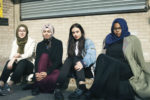
MWM's logo, via their website.
Muslimah Media Watch thanks Hijabtrendz for the tip!
Those of you who speak French should go check out MWM, a new magazine for Muslim women, published in France. It’s first issue is free and currently online. It seems like future issues will require a subscription, but their subscription section isn’t up yet.
The magazine introduces itself by saying:
Today, the Muslim woman in the media is the archetype par excellence of the woman who is oppressed and condemned to a stereotyped representation. But what do we know of them in reality? What are their aspirations, their preoccupations, their dreams, their visions of the world… It appears, ultimately, that we don’t know much about them.
MWM has gone to look for them and hopes to better represent those whose faith constitutes the second-largest religion in Europe.
MWM is an invitation to those who do not share their beliefs, to get to know these women better.
[All quotes in this post are my own translations.]
It’s interesting that the mission of the magazine seems to be primarily geared towards non-Muslims, as a way for them to learn more about Muslim women. Looking through the online articles, it seems like many of them are geared to Muslim women in particular, and several others are geared towards women (or people) in general, and aren’t necessarily specifically Muslim-related. I definitely like this diversity in content, but I’m not sure that this description really reflected what’s in the magazine. At the same time, maybe the inclusion of so many articles that aren’t specific to Muslim women is part of their strategy to help non-Muslims “get to know these women better,” by demonstrating that many “Muslim women’s issues” aren’t actually unique to Muslim women.
It also seems weird for the magazine’s description to talk about Muslim women as “them,” when it appears that most of the writers are Muslim themselves. Anyway, that’s less important. On to the content…
MWM’s Table of Contents lists the topics covered within the magazine: Women of the World, News, Society, Organisations, Environment, Spirituality, Psychology, Fashion, Beauty and Health, Entertainment, Travel, Style, and Cooking. This is a big range, and from what I’ve read, the articles look really interesting, in-depth, and relevant. In fact, I might come back and write more detailed posts on a couple of them that deserve a longer discussion. Some highlights:
An interview with three members (two Muslim and one Christian) of Progress Theatre, a U.S.-based “multidisciplinary troupe of artists hoping to use art to encourage a social conscience, intercommunity dialogue, and cultural awareness.” The troupe’s performances involve “a fusion of theatre, dance, blues, stories, spirituality, R&B, poetry and hip hop, to explore social issues facing American youth.” I really liked one of the Muslim members’ description of her responsibility as a Muslim doing this kind of work:
Being at the service of my society, correcting injustices, whether with my hands, my words or my heart… We have to give a voice to histories that have been unjustly reduced to silence, try to fill the gaps and build understanding between different communities. This is my responsibility as a Muslim artist.
Another article looks at the way that “halal” meat is, and should be, understood, by taking as an example the question of whether foie gras can be truly halal. The article includes an interview with a specialist on halal meat, who explains the processes of slaughtering the animals, as well as the requirements that the animal being slaughtered needs “to have been treated with dignity and respect.” Other articles examine the health effects of pollution and the Islamic arguments for recycling. These topics often get ignored in discussions on issues that Muslims should be concerned about, so it is refreshing to see Muslim responsibilities towards animals and the environment being discussed in so much depth.
The spirituality section contained a great piece on the need for unity, support and solidarity among Muslims and within the larger community. Unfortunately, the word used to describe this concept was “fraternité” (brotherhood), and I would have liked to see a less-gendered word used here, especially in a women’s magazine.* Despite this, it was one of my favourite articles, using examples from the Qur’an and from Islamic history to illustrate the need for Muslims to be involved in their communities and to take care of other people. One quote from it:
True fraternity needs to be a real practice in the life of Muslims. It can be, if it is properly respected, a response to certain current problems due to materialism, individualism, and therefore to egoism. A sense of fraternity that reminds people of the divine dimension of their life; transcendence and community.

An illustration from MWM. Via their website.
The psychology section was also pretty interesting. One article goes into surprising detail about the importance of mutual sexual satisfaction, and acknowledges the existence and value of female sexual desire. It was nice to see this affirmation of sexuality, which was discussed in an informative and professional way, in a magazine for Muslim women, where such topics can sometimes be seen as taboo. Another looks at the guilt that many women feel at the idea of leaving their children with caregivers (either in their home or at a day care) while they go to work. Both of these articles seem relevant and practical, and reflect issues that Muslim women face in their lives. Equally practical and relevant are pieces from the Health section, looking at skin care during the winter, and at how to deal with migraines.
By the way, for anyone wondering about visual representation of Muslim women, I’ll say that I was glad to see a mix of different ethnic background and different clothing (including hijab and non-hijab) represented throughout the magazine’s website.
Overall, MWM seems to be a well-written and informative magazine. Instead of getting trapped into any limiting definitions of what constitutes “Muslim women’s issues,” it covers a wide range of issues that may interest anyone, whether or not they are Muslim (or women.)
* To be fair, the word “fraternité” is often assumed to be non-gendered and to refer to a general sibling-type connection among all people, although I would personally disagree with this assumption. It is also part of the phrase “liberté, égalité, fraternité” (liberty, equality, fraternity), which is the motto of France, and therefore has a lot of resonance among French people. Even so, I know that there have been calls to change the wording of the French motto, and I would also love to see a magazine like this taking the opportunity to re-phrase this wording.



